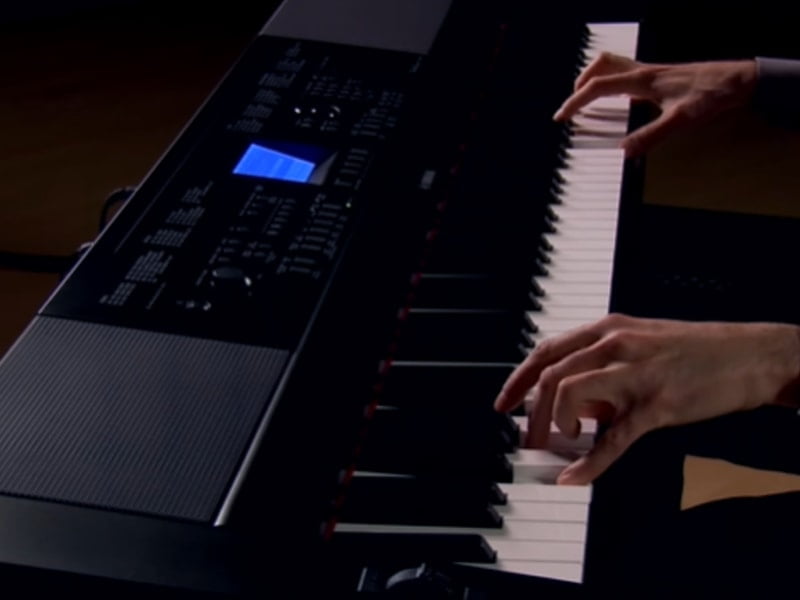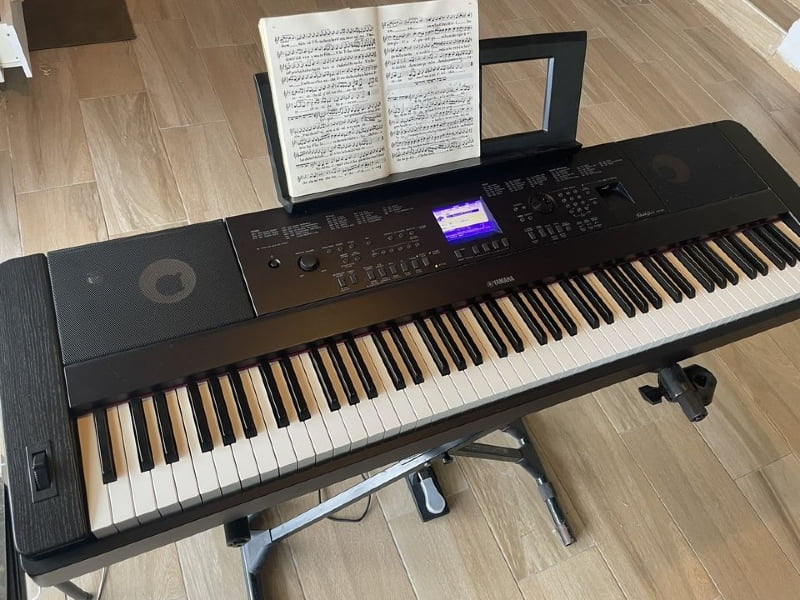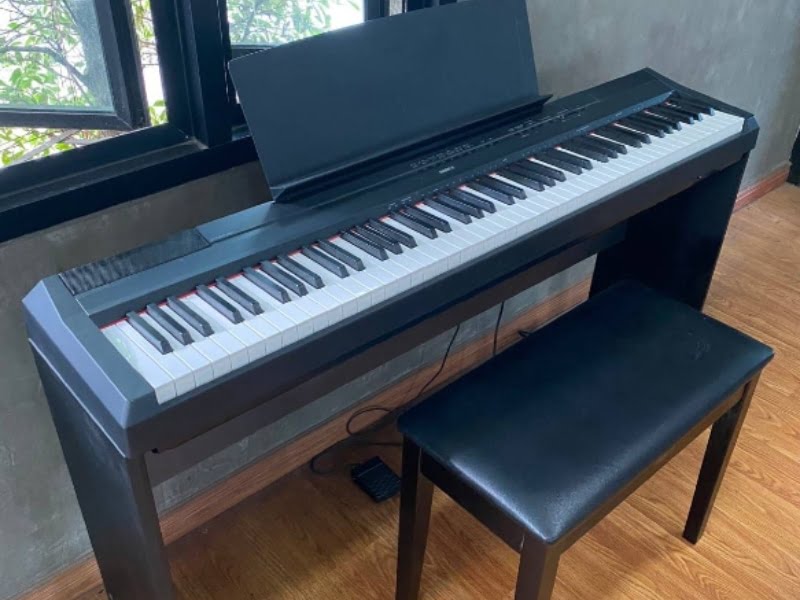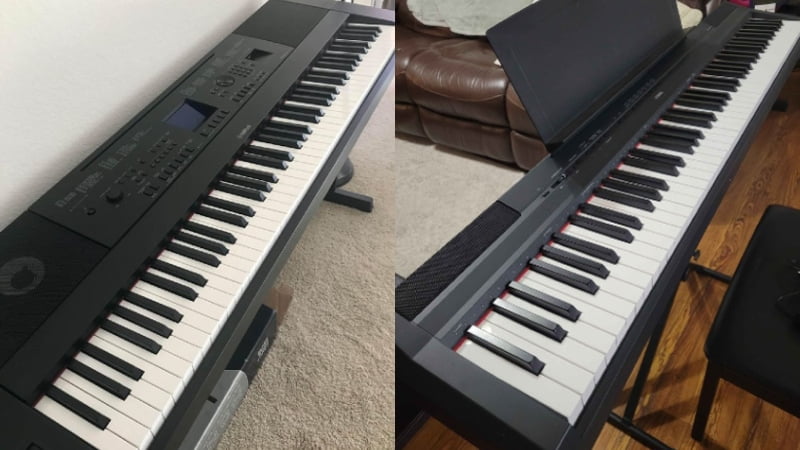Find out which Yamaha piano offers more value for the money in this Yamaha DGX-660 vs P-115 review.
Yamaha is largely seen as the best digital piano brand on the market. They have a wide range of instruments, from affordable options for beginners to premium digital pianos for pros. And in this article, we’ll focus on two Yamaha models that are constantly compared to each other.
These are the Yamaha DGX-660 and the P-115. While they come from different product lines, they are in the same price range and come with a similar feature set.
But which piano is the better pick?
After testing both models and researching the specs, the Yamaha DGX-660 edged out a narrow victory. This is because it has such a versatile set of tones that it would be hard to choose any other model at this price point.
That said, there are many more details to this comparison that you need to know about. And in this Yamaha DGX-660 vs P-115 review, I’ll get into all of them.
Yamaha DGX-660 vs P-115: Comparison Chart


Last update on 2025-12-13 / Affiliate links / Images from Amazon Product Advertising API
Yamaha DGX-660 vs P-115: A Head to Head Comparison
After comparing these pianos based on their tone, feel, and polyphony, the Yamaha DGX-660 won with a score of 3-2. As you can tell, it was a very close comparison, and that’s because these pianos are in the same tier in Yamaha’s hierarchy and you’ll be happy regardless of which option you choose.
However, I gave the advantage to the DGX-660 because it has a much larger sound library. This means that you have more voices to choose from, making it a more versatile insturment overall.
Tone
The winner: Yamaha DGX-660
This is the only category where the Yamaha DGX-660 won over the P-115. While these pianos are tied at almost everything other comparison point, there’s no denying that the DGX-660 wins when comparing tones. The DGX-660 comes with a massive sound library, making it much more versatile and flexible compared to the P-115.

+Tone Generation
There was no winner between these pianos when comparing the tone quality. This is because both pianos have a great sound engine, the Pure CF Sound Engine, which is the generator you’ll find on many Yamaha models in this price range. This sound engine derives its samples from Yamaha CF Grand Pianos, which is why the pianos produce very bright and vibrant tones.
I expected these pianos to have realistic voices, and I wasn’t disappointed. While all the piano tones are great, the portable grand option is by far the best. This voice sounds very identical to a real grand piano and is one of my favorite options in the Yamaha collection.
If you’re looking for realistic piano sounds, the Yamaha DGX-660 and P-115 have got you covered. But as you’ll see in the next section, the P-115 lacked variety in its voices, which is why the point went to the DGX-660.
+Sound Library
One of the best features of the Yamaha DGX-660 is the sound library. This is a piano designed for performers and musicians who play various musical styles. This is why the sound library is packed with voices that you can use to play just about any musical style or genre out there.
To start, it has 151 base voices. These are the voices that utlize the Pure CF Sound Engine or have high-quality samples. These voices will be very realistic and some of the best you’ll find from a digital piano.
The other 350+ voices come from other sound packs. This means that they won’t be as high-quality, but at least you get a lot of variety. And even if the tones from these sound packs aren’t the best, many pianist report that they still use them regularly in their sets.
The P-115, on the other hand, doesn’t come close to this variety. The P-115 is a more traditional digital piano, which means it has much fewer voices. In fact, all you get with the P-115 are the essentials, which are around 14 different sounds.
The P-115 allows you to choose between various piano tones as well as couple of strings, organ, and bass voices. While this can handle the needs of most pianists, many others require variety, which is why the DGX-660 took the point in this category.

Feel
The winner: Tie
The next comparison point was the feel. In my opinion, it’s very important that a digital piano feels similar to an acoustic one. Luckily, both of these pianos met my standards as they come with a great hammer action system that’s designed to simulate the feel of a real acoustic piano.
+Hammer Action
Both of these models boast the Yamaha Graded Hammer Standard or GHS system. This system aims to replicate the feel of an acoustic piano by having slight weight differences in each key. So, when you play either model, you’ll notice that the bass keys are slightly heavier than the treble keys.
I really liked having this feature as it made the pianos feel much nicer to play. The weight allowed me to be a bit more expressive in my playing. On top of that, switching back to an acoustic piano right after trying these out was a breeze since it had such an accurate weight to it.
That said, one thing that both pianos lacked was a realistic key texture. Most digital pianos fall short in terms of key texture because they use glossy plastic keys. Sadly, both pianos fall into the same trap; and while the key texture isn’t that noticeable, most experienced pianists will definitely feel it when playing these pianos.
Polyphony
The winner: Tie

The last comparison point I had for these two pianos was the polyphony. Polyphony is basically the piano’s ability to play multiple notes at the same time. And as much as possible, you want a piano that has a lot of polyphony so that you can play dense chords and be as expressive as you want in your playing.
Both of these pianos have 192-note polyphony. So, you can press all the keys at the same time and expect them to ring out. Not only that, but you can even add more emotions to your playing by using the sustain pedal and having the notes play for a much longer time, even if you play more notes on top of it.
This feature also comes in handy when blending two voices, which is something that both pianos can do. While most people overlook polyphony in modern pianos, it’s very important to ensure that you get a digital piano that has a large maximum polyphony. That way, you open up way more possibilities in your playing.
Yamaha DGX-660 vs P-115: The Similarities
As you might have been able to tell, there are many similarities between these two pianos. I already mentioned that they have the same hammer aciton system and tone generator, which I consider some of the most important digital piano features.
However, the similarities go beyond that. For example, these are both fairly affordable portable digital pianos. So, you’ll be able to bring either option with you to gigs, rehearsals, or even piano lessons.
These pianos offer some of the best value for the money right. And while the Yamaha DGX-660 is slightly more flexible, both options will serve you very well. So, at the end of the day, it’s a matter of choosing the piano that’s right for your needs.
If you’re a person that prefers having a simple set of voices and a piano that doens’t have that many distractions, the P-115 is the best pick. But if you’re looking versatility and flexibility with a digital piano, then I would recommend the DGX-660.
Quick Rundown of the Yamaha DGX-660
- The Pure CF Sound Engine faithfully reproduces the tone of a meticulously sampled and highly acclaimed Yamaha concert grand piano
- GHS weighted action is heavier in the low register and lighter in the high, just like an acoustic piano
- Score display puts music notation of MIDI songs on the screen, helping you play your favorites by following the bouncing ball
- The Piano room lets you choose from a variety of pianos and acoustic settings to create your own personal piano environment
- The 6 track recorder allows you to capture your performances and song ideas, then add additional layers to spice up your pieces
Last update on 2025-12-13 / Affiliate links / Images from Amazon Product Advertising API
Quick Rundown of the Yamaha P-115
- GHS weighted 88 key action is heavier in the low end and lighter in the high end, just like an acoustic piano
- Amplifiers 7 W x 2.The Pure CF Sound Engine faithfully reproduces the tone of a meticulously sampled Yamaha's acclaimed 9 feet CFIIIS concert grand piano
- Pianist Styles turn your simple chords into exciting accompaniment. Play a chord and the Pianist Style gives you a full piano accompaniment
- The Controller App for iOS devices adds a rich, graphic user interface allowing for quick and easy navigation and configuration
- Includes PA150 Power Supply and a Sustain Pedal
Last update on 2025-12-13 / Affiliate links / Images from Amazon Product Advertising API
Product Video
Related Articles to Yamaha Dgx 660
- Yamaha YDP-164 vs DGX-660: Why You Should Go for the DGX-660
- Yamaha DGX-660 vs Roland FP-90: Why the Roland FP-90 Is the Better Pick
- Yamaha DGX-530 vs 660: Why the DGX-660 Is the Better Pick
- Yamaha DGX-505 vs 660: Why the DGX-660 Is the Better Pick
- Yamaha DGX-660 vs DGX-640: A DGX Comparison
- Yamaha DGX-660 vs DGX-630: A DGX Comparison
- Yamaha DGX-620 vs 660: Finding the Best DGX Model
- Yamaha DGX-660 vs YDP-163: Which Is the Better Piano?
- Yamaha DGX-660 vs Roland Juno DS-88: Which Is the Better Piano?
- Yamaha DGX-660 vs Casio PX-360: Which Is the Better Piano?
- Yamaha DGX-660 vs YDP-144: Which Is the Better Yamaha Piano?
- Yamaha DGX-660 vs Korg Havian 30: Which Is the Better Digital Piano?
- Yamaha DGX-660 vs Casio CGP-700: Which Is the Better Pick?
- Yamaha DGX-660 vs YPG-535: Finding the Best Yamaha Digital Piano
- Yamaha DGX-660 vs P515: Is the P515 Worth the Extra Cost?
- Yamaha DGX-660 vs Casio PX-560: Which Piano Offers More Value For The Money
- Yamaha DGX-660 vs 650: A DGX Comparison
- Korg XE-20 vs Yamaha DGX-660: Finding the Best Digital Piano
- Yamaha P45 Vs DGX-660: A Head-to-Head Comparison
- Yamaha DGX 670 Vs 660: The Distinct Difference In Details You Need To Know About
- Yamaha YDP-103 Vs DGX-660: Which Is The Better Yamaha Piano?
- Casio PX-770 Vs Yamaha DGX-660: Should You Get A Portable Or Console Digital Piano?
- Yamaha P71 vs DGX-660: Can the Amazon Exclusive Beat Out the Premium Model?
- Yamaha P125 vs DGX 660 Comparison: Can the P125 Hold Its Own Against the DGX 660?
Related Articles to Yamaha P115
References:
- Yamaha DGX-660: https://europe.yamaha.com/en/products/musical_instruments/pianos/portable_grand/dgx-660
- Yamaha P-115: https://usa.yamaha.com/products/musical_instruments/pianos/p_series/p-115
Lulacruza is an electronic folk duo operating at the junction of the hypermodern and the ancient. Our music weaves together hypnotic female singing, South American folk instruments and electronic processing, while channeling pulsating waves from the source of creation.
Lalucruza is also a community where you can connect with other music lovers to collaborate, exchange ideas and share knowledge. A platform for who wants to learns the basics of playing piano, guitar, drum masters’ technique, etc.. is the premise of our website.
